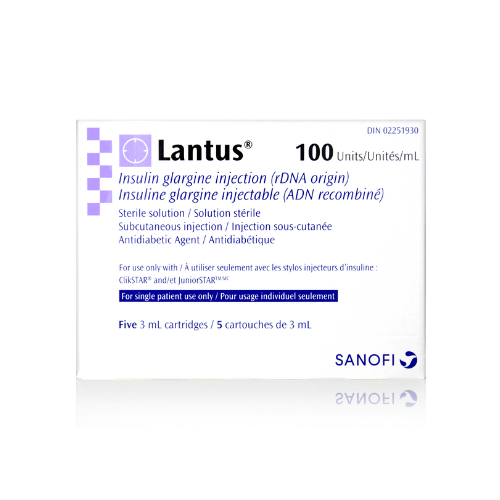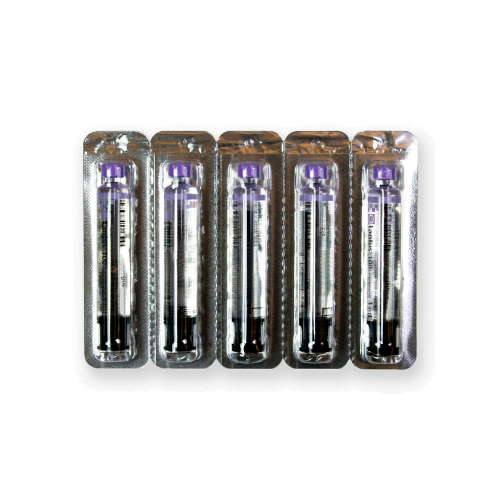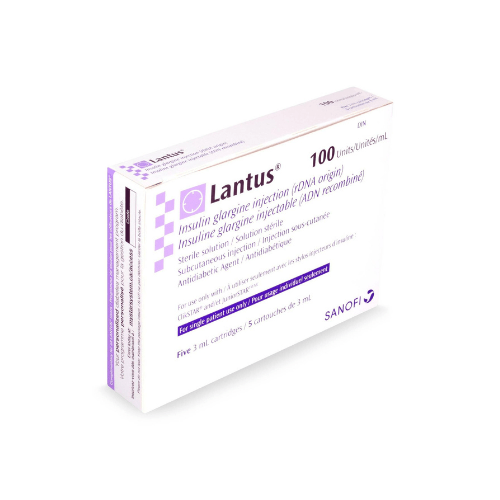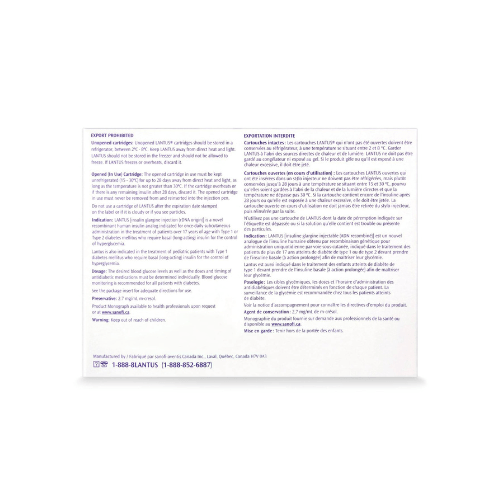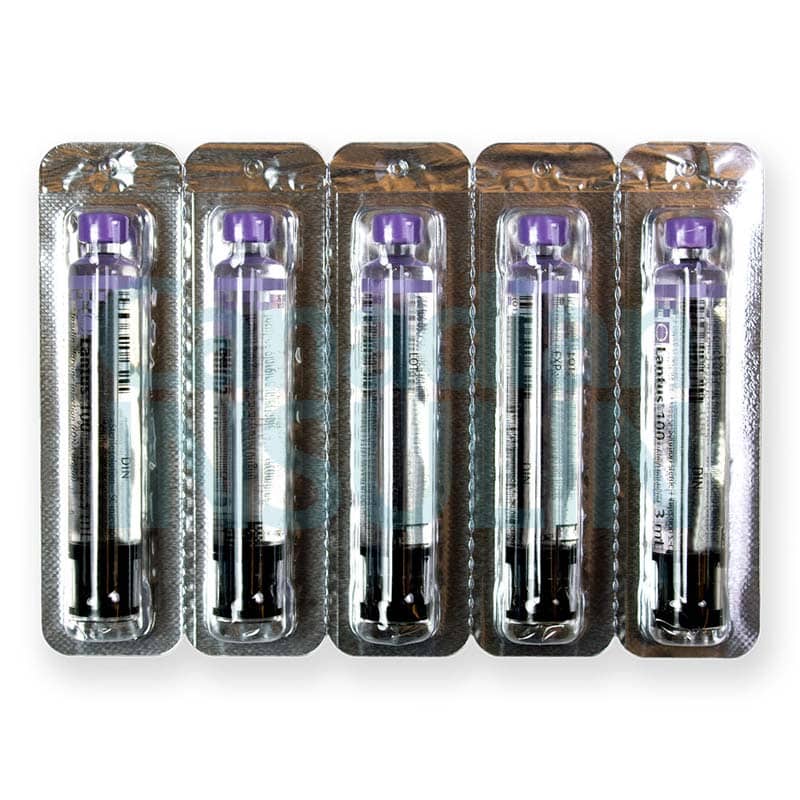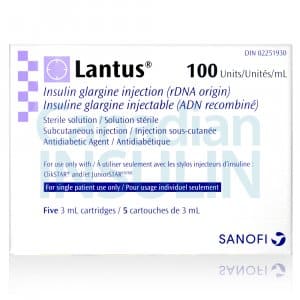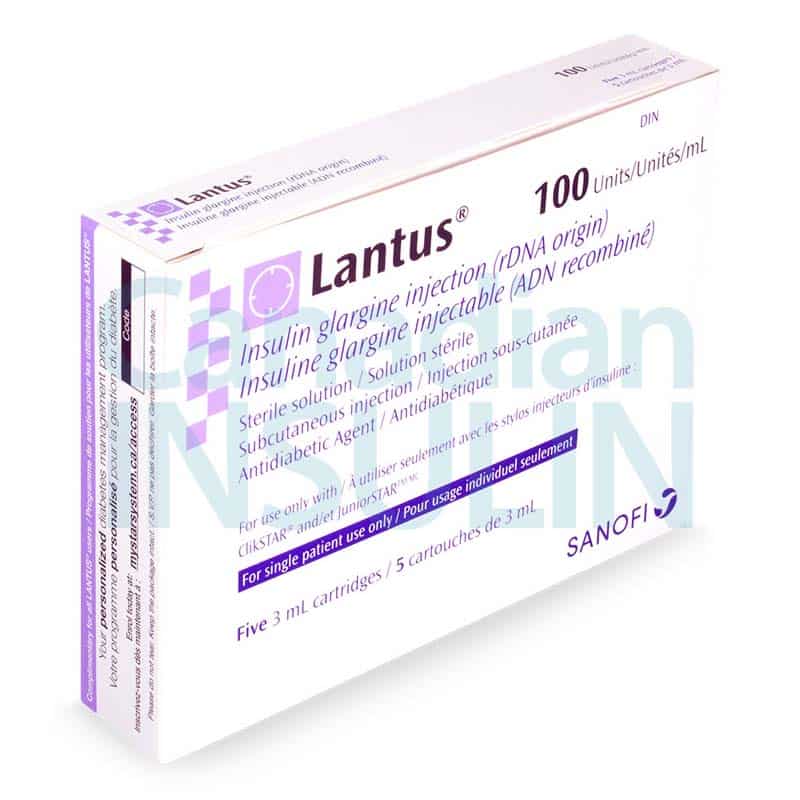Please note: a valid prescription is required for all prescription medication.
Lantus Cartridges: Product Overview, Storage, and Safety
Start 2026 with savings: Use code SAVE10 for 10% OFF all RX meds. Jan–1 Mar. Ozempic from Canada and Mounjaro Vial not included. Offer valid until March 1st. Coupon code cannot be combined with other offers. For products with “Bulk Savings”, the discount will be applied to the regular price for 1 unit. Maximum allowable quantity equal to a 90 day supply per single order.
Maximize your savings with Canadian Insulin: Buy 2 for a 10% discount, or stock up with 3 or more to unlock an incredible 20% off on your insulin needs.
$159.99
You save


Lantus Cartridges are insulin glargine cartridges used as a long-acting (basal) insulin for diabetes management. This page summarizes how the medication works, how cartridges differ from other insulin forms, and key safety and storage points. It also reviews practical handling steps and what to discuss with a clinician.
What Lantus Cartridges Is and How It Works
Insulin glargine is a long-acting insulin designed to help control fasting and between-meal blood glucose. After a subcutaneous injection, it forms small deposits that release insulin gradually, supporting a steady “background” insulin effect. CanadianInsulin.com provides prescription-referral support and may confirm details with your prescriber. Basal insulin is typically used alongside meal planning, glucose monitoring, and, for some people, additional diabetes medicines.
The cartridge format is intended for use with compatible reusable pen injectors that accept replaceable insulin cartridges. Some patients explore Ships from Canada to US when arranging ongoing insulin supplies. For many people, understanding the specific device, dose timing, and storage requirements matters as much as the insulin type itself, because handling errors can lead to unexpected high or low glucose readings.
Why it matters: A consistent daily routine can reduce avoidable dosing and handling mistakes.
Who It’s For
Lantus Cartridges may be prescribed for people who need basal insulin as part of diabetes treatment. Depending on local labeling and individual circumstances, insulin glargine can be used in type 1 diabetes (typically with rapid-acting mealtime insulin) and in type 2 diabetes when basal insulin is appropriate. For background on different diabetes types, see Decoding Diabetes and the Diabetes Overview hub.
This medication is not used to treat diabetic ketoacidosis (DKA), which requires urgent medical care and different insulin approaches. It should not be used by anyone with a known serious allergy to insulin glargine or any component of the formulation. Clinicians may also be cautious in people with frequent severe hypoglycemia (low blood sugar), significant kidney or liver impairment, or those who have difficulty recognizing low blood sugar symptoms.
People who use insulin and are also adjusting diet, activity, or other glucose-lowering drugs may need closer monitoring during changes. If you are learning about broader treatment categories for type 2 diabetes, the Type 2 Diabetes article collection can provide general context.
Dosage and Usage
Insulin glargine is commonly prescribed as a once-daily basal insulin. Many regimens use it at the same time each day to maintain steady coverage, but exact schedules and dose amounts are individualized by the prescriber. Cartridges are used with a compatible pen injector to deliver subcutaneous doses, not intravenous injections. This medicine is also not intended for use in an insulin pump.
General, label-aligned handling steps often include the following:
- Confirm the label and insulin type
- Inspect for discoloration or particles
- Use a new needle each time
- Prime per device instructions
- Inject subcutaneously as directed
- Rotate injection sites routinely
Injection-site rotation helps lower the risk of lipodystrophy (fat-tissue changes under the skin), which can affect insulin absorption. Cartridges should not be mixed or diluted with other insulins unless a prescriber specifically instructs otherwise based on the product’s labeling. For broader education on how different medicines fit together, Common Diabetes Medications can be a useful overview.
Strengths and Forms
Lantus Cartridges are commonly supplied as 100 units/mL insulin glargine in a cartridge format intended for pen injectors. The most common cartridge volume for this product family is 3 mL, but presentation can vary by jurisdiction and pharmacy supply channel. Before use, confirm that the cartridge matches the pen device and the prescribed insulin concentration.
The table below summarizes typical attributes patients may see on packaging:
| Attribute | What it means |
|---|---|
| Concentration | 100 units/mL (U-100) |
| Cartridge volume | Often 3 mL per cartridge |
| Insulin type | Long-acting insulin (basal) |
| Delivery method | Reusable pen injector with cartridges |
Not every pen injector is compatible with every cartridge. Device fit, needle type, and dialing mechanism depend on the pen model. If there is any mismatch between the cartridge and the device on hand, a pharmacist can help confirm compatibility based on product identifiers and manufacturer instructions.
Storage and Travel Basics
Proper storage helps maintain insulin potency. Unused insulin glargine cartridges are generally stored refrigerated at 2°C to 8°C (36°F to 46°F) and should not be frozen. If insulin has been frozen, it should not be used. Keep cartridges away from direct heat and light, and avoid leaving them in a hot car, near radiators, or in direct sun.
After a cartridge is in active use, many insulin products can be kept at room temperature for a limited time; the exact window depends on the specific labeling for that presentation and region. Lantus Cartridges should be checked against the carton and package insert instructions for in-use limits and handling details. For travel planning concepts that may apply to injectable medicines, Travel With Ozempic discusses temperature and packing considerations that can also be relevant for insulin.
Quick tip: Keep a backup cooling plan for longer trips and delays.
If traveling across time zones, dose timing changes should be planned with a clinician. It is also helpful to pack supplies in carry-on luggage, bring extra needles, and keep a copy of prescription information available for security or customs checks.
Side Effects and Safety
The most common and clinically important risk with any insulin is hypoglycemia (low blood sugar). Symptoms can include shakiness, sweating, hunger, headache, confusion, irritability, or dizziness, and severe episodes can lead to loss of consciousness or seizures. Lantus Cartridges can also cause injection-site reactions such as redness, itching, or swelling, especially early in treatment or when technique changes.
Other potential effects include weight gain, fluid retention, and lipodystrophy with repeated injections in the same area. Rare but serious reactions include severe allergy (anaphylaxis), significant swelling, trouble breathing, or widespread rash. Insulin can also lower potassium levels (hypokalemia), which is more likely to be important in people taking certain diuretics or with other medical risks. If severe symptoms occur, emergency evaluation may be needed.
Why it matters: Recognizing hypoglycemia early can prevent escalation to severe events.
Routine monitoring plans vary, but may include home glucose checks, periodic A1C testing, and review of patterns (for example, morning fasting readings). If low blood sugar episodes are frequent or hard to recognize, clinicians may recommend additional education, device changes, or a prescribed rescue plan such as glucagon.
Drug Interactions and Cautions
Many medicines and substances can change insulin needs or mask low blood sugar symptoms. Alcohol can increase hypoglycemia risk in some situations. Beta-blockers may blunt warning signs like tremor and palpitations. Steroids, some antipsychotics, and certain diuretics can raise glucose, sometimes requiring regimen adjustments under medical supervision.
Other glucose-lowering drugs (including GLP-1 receptor agonists, SGLT2 inhibitors, and sulfonylureas) may be used with basal insulin in type 2 diabetes, but combinations can change hypoglycemia risk and should be managed carefully. If a thiazolidinedione such as pioglitazone is used with insulin, fluid retention and heart failure risk may increase in susceptible individuals. Always share a full medication and supplement list with the care team, including non-prescription products.
Extra caution is often needed when switching between insulin products, changing devices, or during acute illness. Appetite changes, vomiting, reduced oral intake, or infections can shift glucose levels quickly, which is one reason sick-day planning is commonly discussed in diabetes care.
Compare With Alternatives
Insulin glargine is one option among several basal insulins. Depending on individual goals and local availability, alternatives may include other long-acting insulins (such as insulin degludec or insulin detemir) or intermediate-acting insulin like NPH. Each has different onset, duration, and day-to-day variability characteristics, which can affect fasting glucose patterns and how dosing is scheduled.
Another comparison is between branded insulin glargine and biosimilar or follow-on insulin glargine products. While these products target similar basal coverage, device options, interchangeability rules, and patient education needs may differ by region. For people with type 2 diabetes, clinicians may also consider non-insulin therapies before or alongside basal insulin, depending on glucose targets, weight considerations, and comorbidities. To browse a range of treatment categories, the Diabetes Medications hub provides a navigation view, and Diabetes Articles offers general education.
Comparisons are most meaningful when they include your typical glucose pattern, hypoglycemia history, schedule constraints, and the specific device you can use reliably. A clinician can also help evaluate whether a cartridge-based pen system is the best fit versus a prefilled pen or vial-and-syringe approach.
Pricing and Access
Access to Lantus Cartridges typically requires a valid prescription, and the prescriber’s directions should match the insulin concentration and device type. When permitted, medications are dispensed and prepared by licensed third-party pharmacies. Coverage and prior-authorization rules vary by plan, and patient out-of-pocket amounts may differ based on deductible status, formulary placement, and whether a biosimilar is considered.
For people paying cash or managing costs without insurance, the main variables often include the prescribed quantity, cartridge presentation, and pharmacy-level dispensing fees where applicable. Documentation needs may include a current prescription, prescriber contact information, and confirmation of the intended device. Educational planning can also include supplies like pen needles, a glucose meter or CGM, and hypoglycemia rescue medication if prescribed. For general lifestyle and self-management topics that may complement medical care, see Managing Type 2 Diabetes and Diet For Insulin Resistance.
Cross-border fulfilment options can vary by eligibility and local jurisdiction. If a patient is reviewing site-wide educational updates, Promotions Information may provide non-clinical context about current programs, but clinical decisions should stay anchored to the prescription and the product labeling.
Authoritative Sources
For official prescribing and safety information, review the reference label on DailyMed: Insulin glargine prescribing details.
For broader clinical standards and monitoring concepts, consult the American Diabetes Association publication: Standards of Care in Diabetes.
Because insulin is temperature-sensitive, it may be sent using prompt, express, cold-chain shipping when required.
This content is for informational purposes only and is not a substitute for professional medical advice.
Express Shipping - from $25.00
Shipping with this method takes 3-5 days
Prices:
- Dry-Packed Products $25.00
- Cold-Packed Products $35.00
Standard Shipping - $15.00
Shipping with this method takes 5-10 days
Prices:
- Dry-Packed Products $15.00
- Not available for Cold-Packed products
What are Lantus Cartridges used for?
Lantus Cartridges contain insulin glargine, a long-acting (basal) insulin used to help control blood glucose between meals and overnight. In type 1 diabetes, basal insulin is usually combined with rapid-acting insulin for meals. In type 2 diabetes, basal insulin may be used when lifestyle measures and other diabetes medicines are not enough to meet glucose targets. Your prescriber selects the insulin type, dose, and schedule based on glucose patterns, risk of hypoglycemia, and other health factors.
Do insulin cartridges work with any pen injector?
No. Cartridges are designed to fit specific reusable pen injectors, and compatibility depends on the pen model and cartridge type. Even if two products have the same insulin concentration (for example, U-100), the cartridge dimensions and coupling mechanism may differ. Using an incompatible pen can lead to leaks, inaccurate dosing, or device failure. If you are unsure, compare the pen’s instructions with the cartridge packaging and ask a pharmacist to confirm the correct match before first use.
Is insulin glargine the same as mealtime insulin?
Insulin glargine is generally used as basal insulin, meaning it is intended to provide steady background insulin coverage. Mealtime (bolus) insulins are typically rapid-acting or short-acting and are used to manage glucose rises after eating. Because these insulins act differently, they are not interchangeable without a clinician’s guidance. If a regimen includes both basal and bolus insulin, the timing, dose calculations, and monitoring plan are individualized to reduce both high glucose and hypoglycemia risk.
What signs of low blood sugar should I monitor for?
Low blood sugar (hypoglycemia) can cause shakiness, sweating, fast heartbeat, hunger, headache, or anxiety. Some people develop confusion, slurred speech, clumsiness, or unusual behavior as glucose drops further. Severe hypoglycemia can lead to seizures or loss of consciousness and may require urgent help. Certain medications, such as beta-blockers, can make warning signs harder to notice. Discuss with your clinician how often to check glucose, when to use prescribed rescue treatments, and when to seek emergency care.
How should I store insulin cartridges at home and while traveling?
Unopened insulin cartridges are commonly stored in a refrigerator and protected from freezing and direct light. Once in use, many insulin products can be kept at room temperature for a limited time, but the exact in-use window depends on the specific labeling for that presentation. For travel, keep insulin away from heat, avoid leaving it in parked cars, and consider insulated packs when needed. Carry extra supplies and keep prescription information accessible, especially when crossing time zones or traveling internationally.
What should I ask my clinician or pharmacist before starting a cartridge pen system?
Helpful questions include: which pen injector is compatible with the cartridge, how to prime the device, and how to confirm the dose was delivered. Ask where to inject, how to rotate sites, and what to do if you see frequent highs or lows after changing devices. It is also reasonable to review your full medication list for interactions and to confirm your glucose monitoring plan. Do not change insulin doses on your own; dosing adjustments should follow prescriber instructions.
What if the insulin looks cloudy or has particles?
Many insulin glargine products are intended to be clear and colorless. If a cartridge looks cloudy, discolored, unusually viscous, or contains particles, do not use it unless the labeling specifically indicates that appearance is expected. Changes in appearance can suggest contamination, improper storage, or product degradation. Replace it with a new cartridge and contact a pharmacist or the prescribing clinic for guidance. If you think a storage issue occurred (such as freezing or overheating), discuss whether remaining supplies are safe to use.
Rewards Program
Earn points on birthdays, product orders, reviews, friend referrals, and more! Enjoy your medication at unparalleled discounts while reaping rewards for every step you take with us.
You can read more about rewards here.
POINT VALUE
How to earn points
- 1Create an account and start earning.
- 2Earn points every time you shop or perform certain actions.
- 3Redeem points for exclusive discounts.
You Might Also Like
Related Articles
Best GLP-1 Supplement for Weight Loss: Evidence and Safety
GLP-1 is a gut hormone tied to appetite and blood sugar control. Prescription GLP-1 drugs act directly on GLP-1 receptors. Supplements do not. That difference is why many “GLP-1” products…
Contour Next Test Strips Practical Use And Compatibility Checks
Key Takeaways Contour Next Test Strips are single-use, in vitro diagnostic strips used with compatible glucose meters. Small details on the box and your technique can affect results. Match strip…
Why Is Ozempic So Expensive? Pricing Factors Explained
Key Takeaways Price varies because list price differs from what payers actually pay. Insurance design (deductibles, coinsurance, formularies) often drives your out-of-pocket amount. High demand and limited competition can keep…
Zepbound Pill Clarified: Injection Reality and Oral Research
Key Takeaways Current form: Zepbound is an injectable medicine, not a tablet. Search intent: “pill” usually means convenience, not a new product. Dosing language: labels use stepwise titration and maintenance…

